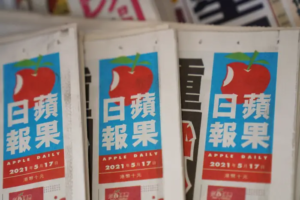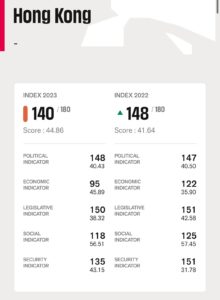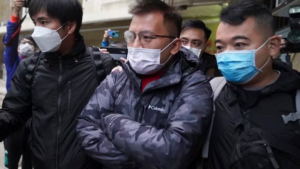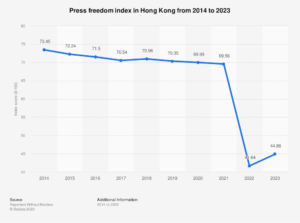Hong Kong Press rated as the lowest in the security indicator among the other 180 countries
Uncategorized
Reporters Without Borders (RSF) established the world press freedom index, which is published yearly. The created index, which was based on survey information from media professionals and sociologists, revealed the degree of freedom enjoyed by journalists in 180 countries (UNESCO, 2021). Five categories have been used by RSF to categorize them: good, satisfactory, troublesome, tough, and very serious scenarios. Hong Kong is one of the 180 nations, and its position dropped dramatically from 18th in 2002 to 148th in 2023. (RSF, 2016)

The results show that press freedom in Hong Kong was significantly impacted after the adoption of the national security law for Hong Kong. It is ranked even lower than a developing nation like Libya. Between 2014 and the present, the press freedom index for Hong Kong has slid from 73.45, which is a satisfying scenario, to 44.86, which is a challenging position. RSF found that many journalists took the difficult decision to leave their homeland under pressure from the Hong Kong government.

So why does this happen? Let’s rewind back to the year 2019.

Due to protests that follow the publication of the national security law, Hong Kong is currently in a chaotic state. A number of senior-level national security legislation violators were detained as a result of the suspension of operations announced by the prominent news outlets Apple Daily News and Stand News. More than 15 journalists have been detained so far, and they are left to report the official news. According to Stand News, they withdrew the commentary piece out of concern for repressions and to stay out of problems. This has already demonstrated that some media outlets are reluctant to break real news to the public, which has decreased press freedom in Hong Kong. Seniors of the popular media institution have been prisoned and were convicted of secession, subversion, and collusion with foreign powers. The arrests widespread fears among journalists, affecting the news reporting pheromone in Hong Kong. The Voice of America was informed by Ronald Chan, president of the Hong Kong Journalists Association, that the HKJA had no involvement at all in the research. He stated, “We didn’t know how it was done until it was published, and we didn’t know where they got the data from or how they analyzed it. However, it is undeniable that Hong Kong faces serious challenges to its press freedom. This shows how serious the press freedom situation is in Hong Kong.
The school system in Hong Kong is also impacted, in addition to journalistic freedom. One of the required subjects for the HKDSE, the most important secondary school exam, is general studies. Students were taught about the fundamentals of Hong Kong law in this subject, which has since been modified to cover a different topic. When faced with a situation like this, individuals are more hesitant to talk and find it more difficult to read the news because they are afraid to learn what the media establishment is hiding. Nobody is aware of the state of affairs now, but the events previously took place are irreversible and will have an impact on journalistic freedom in the future.